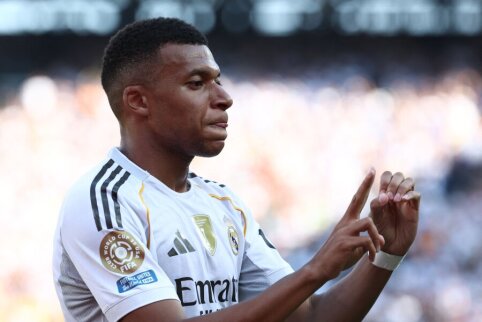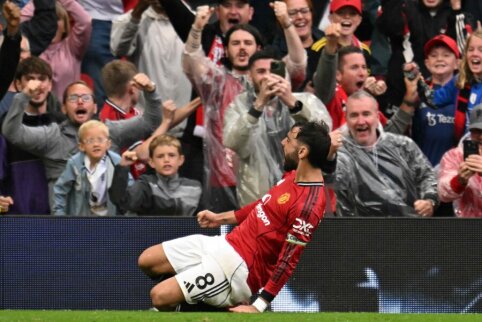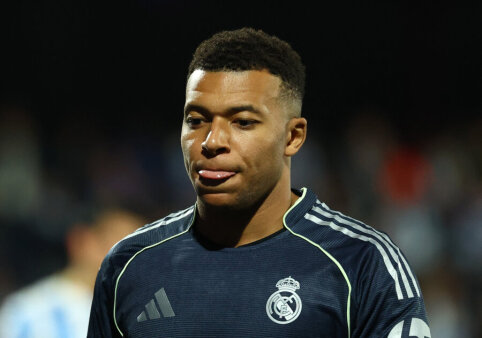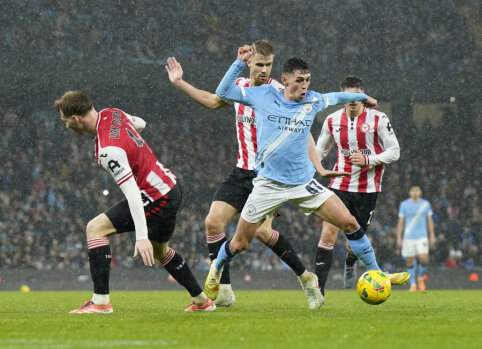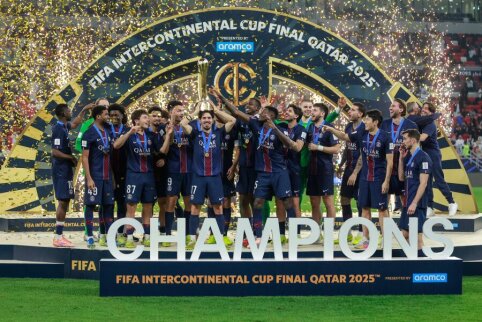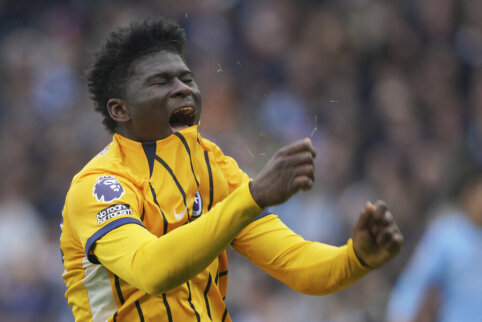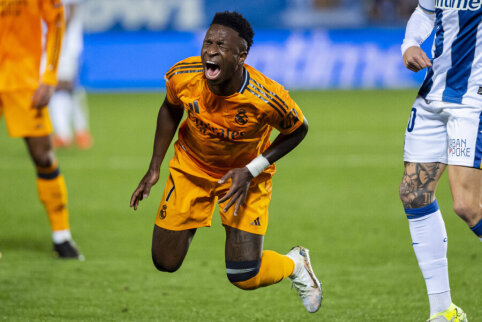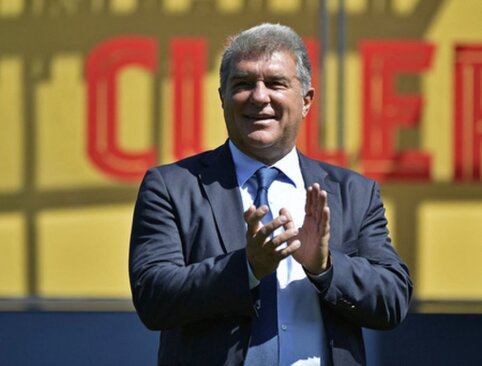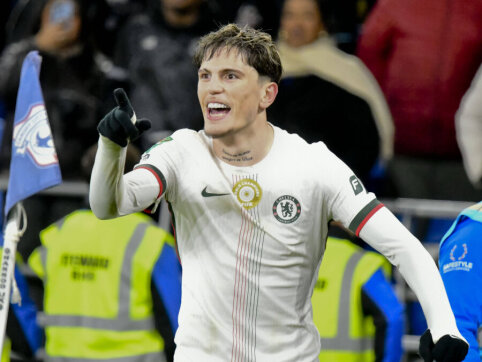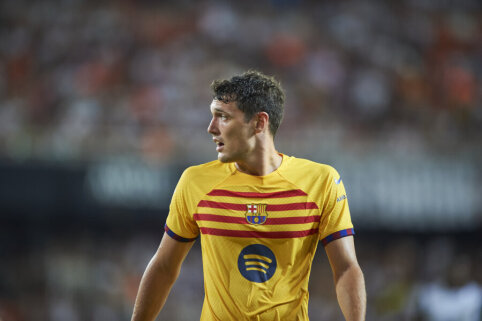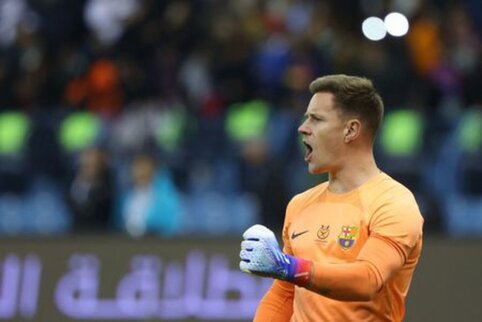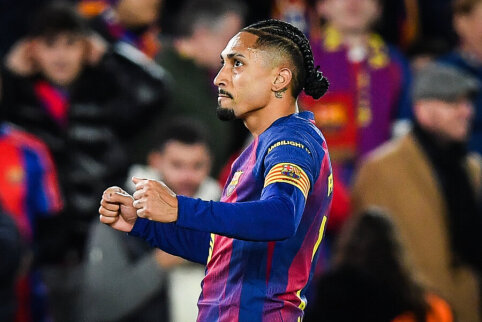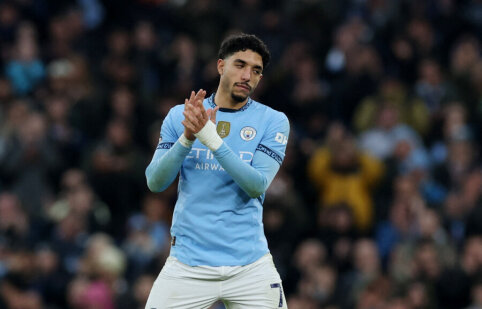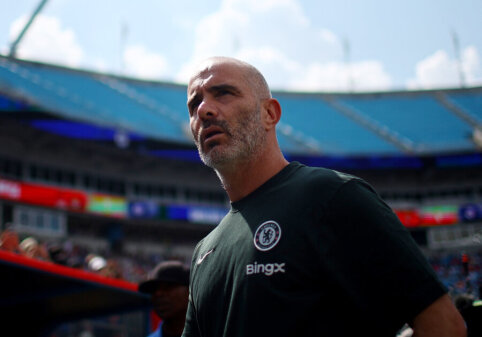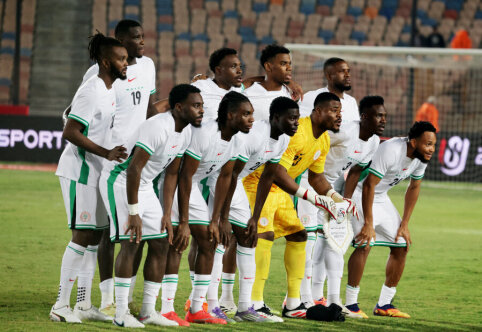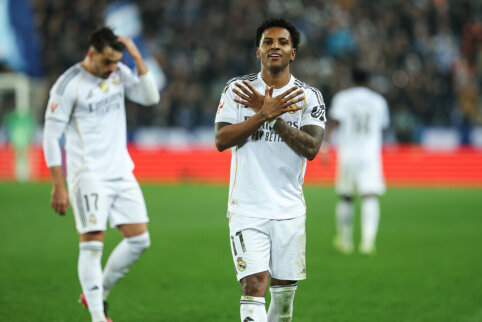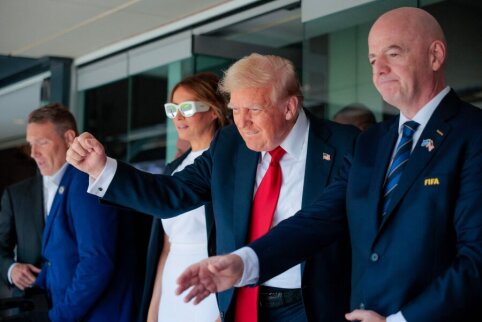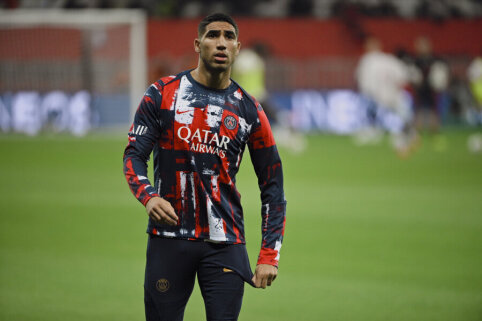 © EuroFootball.com
© EuroFootball.com
During the World Championship, in the "Tribunes" section of the website, visitor Giedrius suggests reading an article about the greatest footballers of all time, who never fulfilled their dream of playing in the World Championships at least once. This time we present Part II of the article. (Part I) Please note that you can send your articles to [email protected] 5. Eric Cantona. Legend of the "Manchester United" club. "King Eric" never managed to fully reveal all of his potential in the French national team. Any "Manchester United" fan watching this temperamental footballer perform for 5 memorable years will attest to the great potential he possessed. It was in this club that Cantona showcased his abilities as one of the best footballers of all time. During his career in Manchester, he won 4 Premier League titles and 2 FA Cups with the club. In those 5 years, he played 107 matches and scored 53 goals. With Cantona, the club won its first trophies in 26 years. Cantona also played for clubs such as "Auxerre", "Marseille" (winning the French league and cup with this club), "Bordeaux", "Montpellier", "Nimes", and "Leeds United". Why did he not participate in the World Cup? Cantona only played 43 matches and scored 19 goals for the national team. If not for his career in Manchester, it would be difficult to place him among the best players who never played in the World Cup because he often clashed with coaches, discussed team tactics with the media, and was frequently ignored or not called up for friendly matches by national team coaches. Cantona could have participated in two World Cup tournaments during his career, but both times France sensationally did not advance from their European qualification group. Despite being considered one of the most dangerous attacking pairs in the world with Jean-Pierre Papin before the 1990 World Cup in Italy, France unexpectedly failed to progress past the group stage. Cantona scored 1 goal during the qualifiers. In the 1994 qualifiers for the World Cup in the U.S., France started confidently after losing in the first round to Bulgaria, winning 5 matches in a row. It seemed that nothing could stop the French from reaching the World Cup with Cantona this time. However, in the last matches against the Bulgarians, a draw was enough for the French. That match, played in a packed stadium in Paris, saw the French go ahead 1-0 after Cantona's goal, but then something unbelievable happened. The French seemed to stop playing, and Emil Kostadinov sealed the Bulgarians' victory, crushing the French hopes of returning to the World Cup after an 8-year absence. Cantona scored 6 goals in the qualifiers, but after France's failure, the new national team coach, Aime Jacquet, decided to renew the squad and Eric Cantona was no longer called up to the team. 4. Bernd Schuster. One of the best midfielders of his generation, receiving the greatest recognition in Spain rather than in his native Germany. Schuster began his career at the "Koln" club in 1978 and immediately became a German champion in the first season. In 1980, Schuster joined the West German national team and became a European champion. Although he played only two matches, experts rated his performance in those matches very highly. For a long time in Germany, there had not been such a technical, creative midfielder. After that championship, many famous European clubs became interested in him, and the fight for Schuster's signature was won by "Barcelona". Here, he immediately became a favorite of the fans but later moved to the mortal enemies' camp at Real Madrid. Nevertheless, he is still respected among fans of both clubs. Schuster was a three-time national champion with Spanish clubs. Why did he not participate in the World Cup? Schuster was a controversial figure, always expressing his opinion without holding back, even if it landed him in trouble. At that time, the German national team was one of the strongest in the world, but the national team coach, Jupp Derwall, struggled to find a place on the field for a technical, creative midfielder who didn't fit the disciplined German football model. Schuster not only clashed with the coach but also with the national federation. At the age of just 24, he declared that he would never play for the national team again. Thus, one of the most talented midfielders of the 1980s never had the opportunity to participate in a World Cup. Germans lost a very talented midfielder, who may have been needed in 1982 and 1986 when they finished second. Currently, Schuster lives in Spain and coaches successfully in the middle-tier Spanish leagues. Last season with the "Getafe" team, he finished 9th in the Spanish league. 3. George Weah. One can only feel sorry for this talented forward, as he was born in Liberia, a country where sports are not a top priority due to poverty, wars, uprisings, and general unrest. Weah won all possible individual awards as the best player in Europe and Africa in 1995 but fans missed out on seeing the best player of the year playing in the World Championships. Weah is a player from Africa who had one of the best careers in Europe of all African players. Arriving in Europe in 1988, he joined the French "AS Monaco" club and won the French Cup in 1991. After this season, he moved to "Paris Saint Germain", where he spent three great years and won the French championship in 1994. In 1995, with the club, he reached the UEFA Champions League semifinals but after a fierce battle, lost to "Milan" with a score of 0:3 in a two-match series. Weah became the top scorer of that season's Champions League with 7 goals. After the season, many top European clubs were interested in him, but it was the "Milan" team that signed him. He gained international recognition there and helped the club win the Italian championships in 1996 and 1999. Later, he briefly played for London's "Chelsea", "Manchester City", "Marseille", and ended his career in the United Arab Emirates. He was a powerful forward whose playing style closely resembled Didier Drogba's in England. After retiring, Weah contributed greatly to the development of African football and became involved in politics and charity work to help disadvantaged children in his country. Why did he not participate in the World Cup? George Weah desperately wanted to play in the World Cup. He not only played for the national team but also performed the duties of a team manager, taking care of all team-related matters, and sometimes even acting as a team coach, selecting the team lineup for matches. In his country, he was idolized, and if he had succeeded in leading the team to the World Cup, his popularity would have reached unimaginable heights. However, other players in the national team were significantly less skilled, and Weah alone was unable to lead the team to the World Cup. In the 1986 qualifiers, when Liberia withdrew from the African zone after the first round, losing to Nigeria with a score of 0:4. In 1990, Liberia finished second in the African group qualifiers, only behind Egypt, but Weah scored 1 goal in the qualifiers. In 1994, due to unrest in the country, Liberia did not even participate in the qualifiers for the World Cup in the United States. In 1998, Liberia finished third in the group, and Weah scored 2 goals. Finally, in 2002, Liberia ended up second in the African group, falling one point behind Nigeria, and Weah scored 2 goals. This was Weah's last chance to participate in the World Cup, as he retired shortly after this qualifying tournament. 2. George Best. One of the best footballers of all time. Even the king of football Pele named him the best player he had ever played against. Best, with his incredible speed and football tricks, could never showcase all his abilities on the World Cup stage. Born in Belfast, Northern Ireland, he was noticed by "Manchester United" scouts at the age of fifteen and invited to this legendary club. Best spent his best career years in this club. Due to his playing style, he gained the sympathy of many fans, including many female admirers. Legends about his parties and socializing with many girls spread throughout England. He was even considered the fifth member of the legendary band "The Beatles". Perhaps due to his lifestyle, he was able to remain in football only until the age of 27. However, his achievements with "Manchester United" speak for themselves: two-time English champion (1965, 1967), winner of the European Cup in 1968, best European footballer in 1968, 466 matches for Manchester United, 178 goals scored, the top scorer of the United for 6 seasons, the top scorer of the English league in 1968 with 28 goals. An incredible achievement, given that he mostly scored his goals by cutting through the left side as a midfielder. His playing style most closely resembles that of Ryan Giggs at his best, but Giggs never reached the same level of skill, tricks, or speed with the ball. Why did he not participate in the World Cup? Best was born in Northern Ireland and was happy playing for his national team, where he scored 9 goals in 37 matches. However, he was always tightly marked in the national team, and he couldn't show all his skills because his teammates were considerably weaker. In the 1966 European qualifiers for the World Cup in England, Best and Northern Ireland were closest to reaching the World Cup, as they were just one point behind Switzerland in their group. In the 1970 qualifiers, Northern Ireland again finished second in the group, ahead of the Irish and trailing behind the Soviet Union by two points. Best scored one goal in the qualifiers. In 1974, Northern Ireland finished just third in the group, with Best not standing out. In the 1978 World Cup qualifiers in Argentina, Best was no longer there. Thus, World Cup fans missed out on seeing one of the best footballers of all time showcasing his skills at the most prestigious tournament. 1. Alfredo Di Stefano. If the best World footballer was chosen based on his achievements with clubs, Di Stefano would have no equal in the world. Starting his football career in his native Argentina with the "River Plate" and "Huracan" clubs, he twice became a champion of the Argentine league (1945, 47). During that time, he also won the Copa America with the Argentine national team in 1947 (scoring 6 goals). He later moved to the Colombian "Millonarios" team, where he became a four-time Colombian league champion (1949, 51, 52, 53) and also played for the Colombian national team. It's worth noting that big money was being earned in the Colombian leagues at that time, and players from many South American countries were moving there to play. However, European powerhouses also sent their representatives to this league to look for talent, including Alfredo Di Stefano. It was at this club that both Barcelona and Real Madrid noticed him, but it was the latter that won the fight for the player. Coming to Europe, Di Stefano became a true star of Real Madrid and, together with the club, dominated Europe for a whole decade. He won five European Cup titles (1956, 57, 58, 59, 60), 8 Spanish league titles (1954, 55, 57, 58, 61, 62, 63, 64), one Spanish Cup (1962), and one Intercontinental Cup (1960). He was twice named the best European footballer (1957, 59), was five-time top scorer in the Spanish league (and once each in the Argentine and Colombian leagues). In 282 matches for Real Madrid, he scored 219 goals. Thus, his club career was more than impressive. Why did he not participate in the World Cup? However, Di Stefano's national team career did not go as smoothly. Part of the reason was his focus on club competitions as they meant more to him. He played for national teams in three countries. Players were not restricted to represent only one country at that time, and Di Stefano was born in Argentina but became more of a Spaniard than an Argentinian. He only played 7 matches and scored 7 goals for the Argentinian national team, participating in a few friendly matches and in one Copa America tournament, which they won. Later, he went to play in Colombia and played 4 friendly matches for the Colombian national team, not scoring any goals. Finally, he received Spanish citizenship, and already not in top form, managed to play 31 matches and score 23 goals for the Spanish national team. This "migration" and becoming a citizen of another country hampered his ability to showcase his talents in the most prestigious tournament – the World Cup. When he began his career in Argentina, World Cup competitions were hampered by World War II in 1942, Uganda withdrew from the qualifiers for the 1950 World Cup when Di Stefano was already in Colombia. In 1954, he wasn't a Spanish citizen yet, and in 1958 Spain sensationally finished second in the qualification group, despite having Kubala and Di Stefano (he scored 1 goal in the qualifiers) in the team. Finally, in 1962, Spain qualified for the World Cup in Chile. In the qualifier, Di Stefano scored 1 goal in the two-match series against Wales and seemed poised to impress millions of fans worldwide, but just before the tournament, he suffered a serious injury. Di Stefano was only included in the national team squad as an assistant coach, and Spain was eliminated after the group stage, as nobody in that team could replace Alfredo Di Stefano. Thus, the World Cup lost another superstar who brightly shined in European club football for a good decade. There are many other footballers who never played in the World Cup but had great careers with their clubs, such as: J.Litmanen, E.Gudjohnsen, J.Angloma, F.Chalana, N.Dobrinas, A.Mikhaličenka, A.Yeboah, I.Wright, Pareda, D.Ginola, B.Boli, F.Sauzee, I.Dobrovolskis, A.Kanchelskis, N.Anelka, M.Jardel, G.Elber, M.Scholl, Aguas, G.Lentini, M.Simone, F.Ravanelli, H.Salihamidzic, J.Carew, and many others. However, the most prominent players, in my opinion, are listed in the article. I believe these players would have brought new colors to the World Cup, as they were exceptional personalities and fantastic players who would have made the World Cup even more impressive and attractive.

